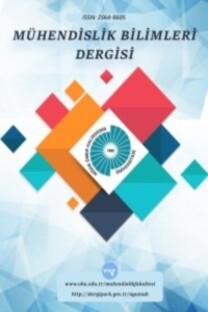Farklı oranlardaki poliolefin polimer karışımları ve SBS kopolimerinin bitümün viskozitesine ve sıcaklık hassasiyetine etkilerinin karşılaştırmalı olarak değerlendirilmesi
Bitüm modifikasyonu, polimer, poliolefin, SBS, Viskozite
Comparatively evaluation of the effects of polyolefin polymer blends in different ratios and SBS copolymer on viscosity and temperature susceptibility of bitumen
Bitumen modification, Polymer, Polyolefin, SBS, Viscosity,
___
- D. Whiteoak, J. Read, Shell bitumen handbook. Fifth edition, London, 2003.
- A. Behnood and M. M. Gharehveran, Morphology, rheology, and physical properties of polymer-modified asphalt binders. European Polymer Journal, 112, 766 - 791,2019.https://doi.org/10.1016/j.eurpolymj.2018.10.049.
- B. Furtana, E. Yalçın, B. V. Kök, and M. Yılmaz, Laboratory comparison of EVA based resin and SBS modified bituminous binder. Niğde Ömer Halisdemir Üniversitesi Mühendislik Bilimleri Dergisi, 9 (1), 358 - 365, 2020. https://doi.org/10.28948/ngumuh.561615.
- Y. Ma, H. Zhou, X. Jiang, P. Polaczyk, R. Xiao, M. Zhang and B. Huang, The utilization of waste plastics in asphalt pavements: A review. Cleaner Materials 2, 100031,2021.https://doi.org/10.1016/j.clema.2021.100031.
- T. Geçkil and C. B. İnce, Atık LDPE' nin asfaltın fiziksel ve işlenebilirlik özelliklerine etkisi. Gümüşhane Üniversitesi Fen Bilimleri Enstitüsü Dergisi, 11(4), 1103 -1114,2021. https://doi.org/ 10.17714/gumusfenbil.931151.
- P. Ahmedzade, The investigation and comparison effects of SBS and SBS with new reactive terpolymer on the rheological properties of bitumen, Construction and Building Materials 38, 285–291, 2013. http://dx.doi.org/10.1016/j.conbuildmat.2012.07.090.
- D. Jubinville, E. Esmizadeh, S. Saikrishnan, C. Tzoganakis, T. Mekonnen, A comprehensive review of global production and recycling methods of polyolefin (PO) based products and their post-recycling applications. Sustainable Materials and Technologies, 25, e00188, 2020. https://doi.org/10.1016/ j.susmat.2020.e00188 .
- R. O. Ebewele, Polymer Science and Technology. CRC Press LLC, New York, 2000.
- G. D. Airey, Rheological properties of styrene butadiene styrene polymer modified road bitumens. Fuel, 82, 1709 -1719, 2003. https://doi.org/10.1016/S0016-2361(03)00146-7 .
- G. Polacco, S. Filippi, F. Merusi, G. Stastna, A review of the fundamentals of polymer-modified asphalts: Asphalt/polymer interactions and principles of compatibility. Advances in Colloid and Interface Science, 224, 72-112, 2015. http://dx.doi.org/ 10.1016/j.cis.2015.07.010 .
- Q. Zhang, T. Wang, W. Fan, Y. Ying, Y. Wu, Evaluation of the properties of bitumen modified by SBS copolymers with different styrene–butadiene structure, Journal of Applied Polymer Science, 40398, 1-7, 2014, https://doi.org/10.1002/app.40398 .
- L.B. Canto, G.L. Mantovani, E.R. deAzevedo, T.J. Bonagamba, E. Hage and L.A. Pessan, Molecular characterization of styrene-butadiene-styrene block copolymers (SBS) by GPC, NMR, and FTIR. Polymer Bulletin,57,513–524,2006, https://doi.org/10.1007/s00289-006-0577-4.
- KRATON™ D1192 A Polymer, Kraton data documan. K0017 Europe 2/24/2022, https://kraton.com/products/ KRATON_D_SBS_SBS_OE.php. 07.02.2023.
- J.G. Drobny, Handbook of Thermoplastic Elastomers. Second Edition, Elsevier, 2014.
- P. Ahmedzade, A. Fainleib, T. Günay and O. Grigoryeva, Geri dönüştürülmüş atık polipropilenin bitümlü bağlayıcılarda kullanılması. İMO Teknik Dergi, 7497-7513, Yazı 456, 2016.
- İ. Bektaş, E. Yalçın, Ö. E. Yamaç and M. Yılmaz, İki farklı düşük yoğunluklu polietilen (LDPE) plastik atığın bitüm modifikasyonunda kullanımı. Fırat Üniversitesi Müh. Bil. Dergisi, 33(1), 339-346, 2021. https://doi.org/10.35234/fumbd.868039.
- M. R. Kakar, P. Mikhailenko, Z. Piao, M. Bueno and L. Poulikakos, Analysis of waste polyethylene (PE) and its by-products in asphalt binder. Construction and Building Materials, 280, 122492, 2021. https://doi.org/ 10.1016/j.conbuildmat.2021.122492.
- A. Eckstein, J. Suhm, C. Friedrich, R.D. Maier, J. Sassmannshausen, M. Bochmann and R. Mulhaupt, Determination of plateau moduli and entanglement molecular weights of ısotactic, syndiotactic, and atactic polypropylenes synthesized with metallocene catalysts. Macromolecules, 31, 1335-1340, 1998. https://doi.org/10.1021/ma971270d
- X.M. Zhang, S. Elkoun, A. Ajji, M.A. Huneault, Oriented structure and anisotropy properties of polymer blown films: HDPE, LLDPE and LDPE. Polymer 45, 217–229,2004. https://doi.org/10.1016/j.polymer.2003.10.057.
- S. Ho, R. Church, K. Klassen, B. Law, D. MacLeod, and L. Zanzotto, Study of recycled polyethylene materials as asphalt modifiers. Canadian Journal of Civil Engineering,33,968–981,2006. https://doi.org/10.1139/L06-044.
- X. Zhao, M. U. Rahman, T. Dissanayaka, F. Gharagheizi, C. Lacerda, S. Senadheera, R. C. Hedden and G. F. Christopher, Rheological behavior of a low crystallinity polyolefin-modified asphalt binder for flexible pavements. Case Studies in Construction Materials 15, e00640, 2021. https://doi.org/10.1016/j.cscm.2021.e00640.
- İ. Gökalp, H.M. Çetin, Y. Özinal, H. Gündoğan, V.E. Uz, Polimer modifiye bitüm modifikasyonuna etki eden parametreler üzerine bir literatür araştırması, Niğde Ömer Halisdemir Üniversitesi Mühendislik Bilimleri Dergisi,8(2),954-964,2019. https://doi.org/ 10.28948/ngumuh.479148.
- ASTM-D5, Standard Test Method for Penetration of Bituminous Materials, West Conshohocken, 2006.
- ASTM-D36, Standard Test Method for Softening Point of Bitumen (Ring-and-Ball Apparatus), West Conshohocken, 2006.
- ASTM-D-4402. Standard Test Method for Viscosity Determination of Asphalt at Elevated Temperatures Using a Rotational Viscometer, 2002.
- J. P. Zaniewski and M. E. Pumphrey, Evaluation of performance graded asphalt binder equipment and testing protocol, West Virginia, Technical Report, April 2004.
- D. Lesueur, The colloidal structure of bitumen: Consequences on the rheology and on the mechanisms of bitumen modification. Advances in Colloid and Interface Science145,42–82,2009. https://doi.org/10.1016/ j.cis.2008.08.011.
- A. Schaur, S.H. Unterberger, R. Lackner, Impact of molecular structure of PP on thermo-rheological properties of polymer-modified bitumen. Construction and Building Materials, 287, 122981, 2021. https://doi.org/10.1016/j.conbuildmat.2021.122981.
- T. McNally, Polymer Modified Bitumen, Properties and characterisation. Woodhead Publishing Limited, Canada, 2011.
- ISSN: 2564-6605
- Yayın Aralığı: 4
- Başlangıç: 2017
- Yayıncı: Niğde Ömer Halisdemir Üniversitesi
Hüseyin Hilmi ASLANBAY, Oğuz DÜĞENCİ, Selçuk Serdar SERPİL
Genipin ile çapraz bağlı nanokapsüllerin sentezi ve karakterizasyonu
Şeyma ÇAĞLAR, Deniz AKIN ŞAHBAZ
Burak ARSEVEN, Said Mahmut ÇINAR
EEG İşareti tabanlı anksiyete sınıflandırması için dalgacık dönüşümü ile öznitelik çıkarma
Shams Qahtan Omar OMAR, Cengiz TEPE
AISI 1050 çeliğinin delinmesinde itme kuvveti optimizasyonu
Murat ÖZSOY, Yunus Zübeyir TURGUT, Neslihan ÖZSOY, Seçil EKŞİ
Melike YILANKIRKAN, Mehmet BİLİM
Lazer tabanlı sensörler kullanılarak rüzgâr hızı ve yönü ölçüm cihazı tasarımı
